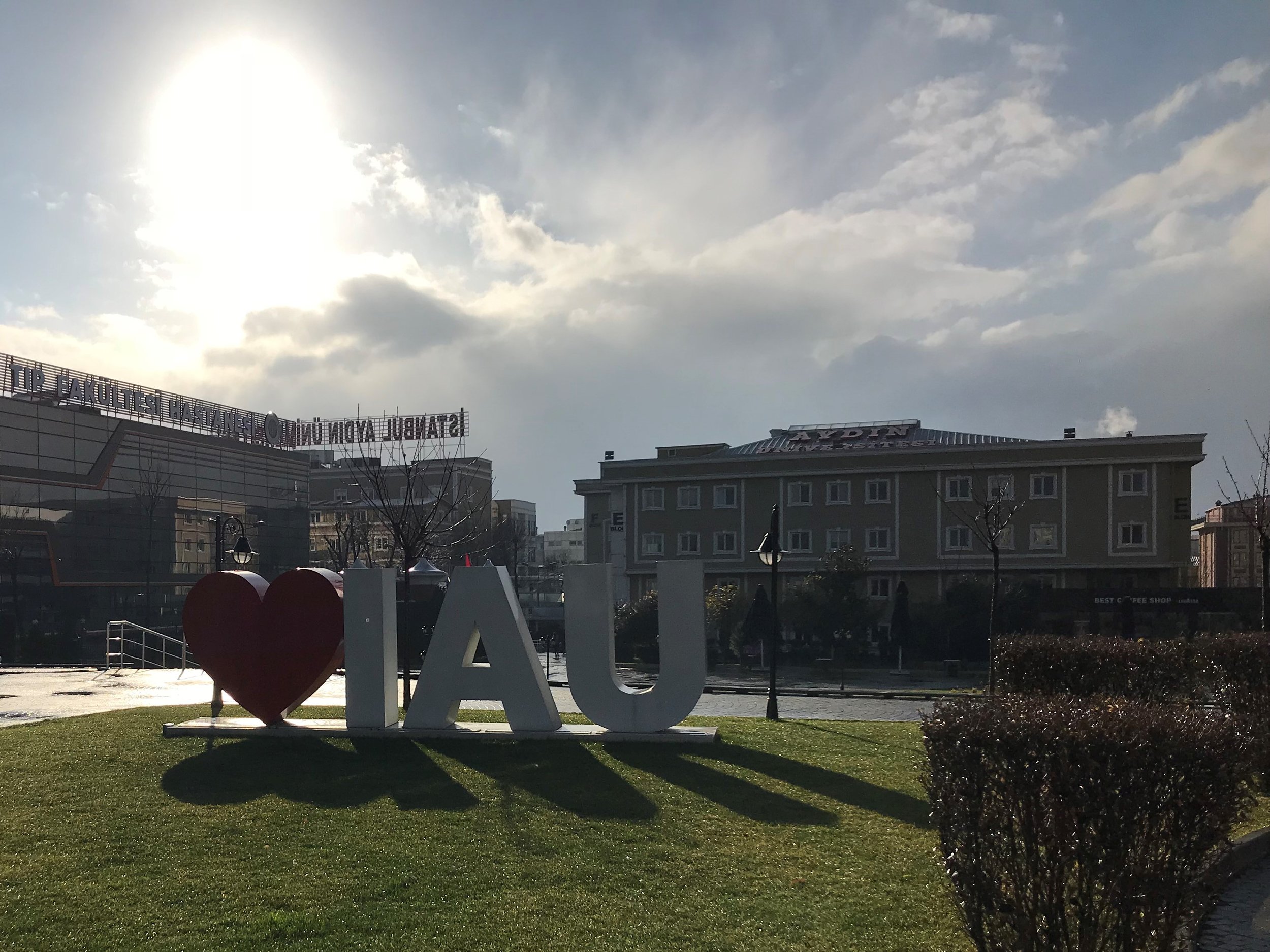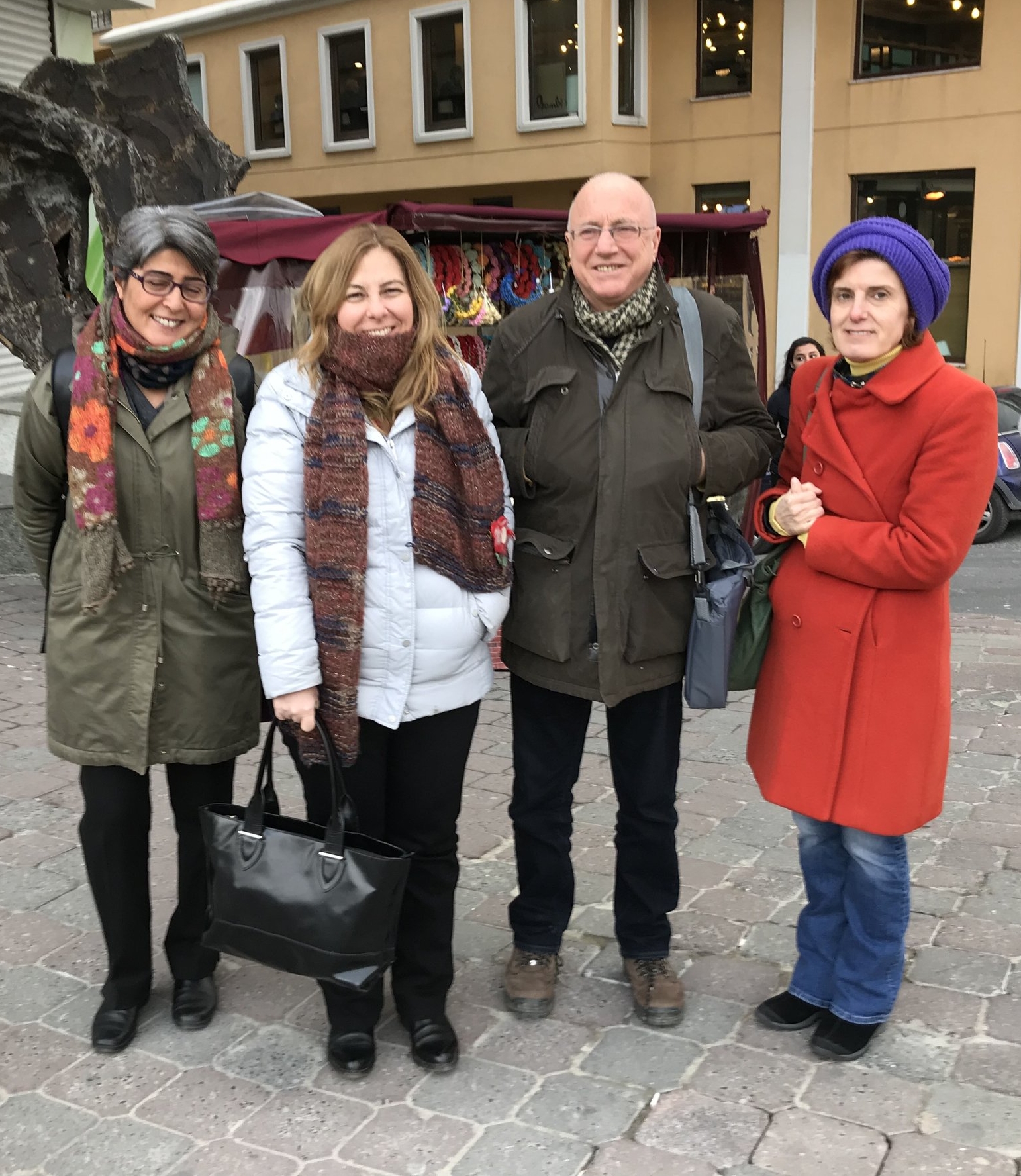Providers ASPIRE in Istanbul
When the opportunity arose in Fall 2017 for us at Istanbul Aydin University to collaborate with Columbia University to carry out a study in Istanbul, we were happy about the chance to contribute to and learn from CU School of Social Work's extensive research related to refugees. The study is Providers ASPIRE, in which we will examine secondary trauma among mental health and social service providers working with Syrian refugees in Istanbul. We had previous research experience in social work with migrants and refugees, migrants' location in social institutions such as education, and forced migration and social exclusion. However, secondary trauma among service providers working with refugees is a brand-new study area for us.
A beautiful afternoon at Istanbul Aydin University in January 2018.
Why is studying secondary trauma in the context of service provision to Syrian refugees important? Exposed secondarily and repeatedly to the traumatic experiences of refugees, service providers may be psychologically influenced. Conversations with providers and existing literature demonstrate that these experiences may cause secondary trauma symptoms among professionals who bear witness to the survivors' account of trauma (Guhan & Liebling-Kalifani, 2011).
From left to right: Co-Investigators Drs. Neşe Şahin Taşğın, Deniz Yükseker, and Uğur Tekin with ASPIRE's Filiz Katibe Şaşaoğlu.
It is increasingly recognized that “there is a cost to caring” (Figley, 1995), such that service providers – particularly those within health or social care settings – may suffer adverse effects to personal well-being as a result of their professions. Furthermore, it is widely acknowledged in the existing literature that working with survivors of trauma can impact professionals in the form of secondary trauma or similar constructs (McCann & Pearlman, 1990; Herman, 1992; Figley, 1995). There is also a growing body of psychological evidence demonstrating that positive changes can also accompany traumatic events, and there have been several attempts to conceptualize these possible positive effects as well, including Compassion Satisfaction, Vicarious Posttraumatic Growth, Adversarial Growth, and Vicarious Resilience (Figley, 2002; Arnold, Calhoun, Tedeschi, & Cann, 2005; Linley, Joseph, & Loumidis, 2005; Hernandez, Gangsei, & Engstrom, 2007).
However, limited attention has been paid to service providers who assist or support refugees in their recovery, especially those in the Middle East. Unidentified and untreated effects of the workplace can negatively affect service providers, those they care for, and the agencies they work for. Therefore, we feel a comprehensive assessment is needed to investigate these effects of secondary trauma more thoroughly.
The Providers ASPIRE team brainstorming on our qualitative and quantitative surveys. From left to right: Elif Demirbaş, Melissa Meinhart, Filiz Katibe Şaşaoğlu, Dr. Deniz Yükseker, Kutay Kutlu, and Dr. Uğur Tekin.
Given the notable gap in mental health research for countries neighboring Syria, this proposed study will focus in Istanbul, Turkey – a context with a large influx of Syrian refugees in the last few years as well as well-established service provision. To date, no study has explicitly examined secondary trauma exposure of direct care providers in Syria’s neighboring countries and only a handful of reports address service provision. The study focus is to understand the secondary trauma mental health and social service providers experience in working with Syrian refugees and to provide a forum for training after findings are compiled. Through a mixed methods approach, Providers ASPIRE's goals are to contribute both to research and practice through the following aims:
Aim 1: To examine prevalence of providers’ level of anxiety, PTSD, stress, compassion fatigue, secondary trauma, organizational support, social support, and level of satisfaction.
Aim 2: To examine the type of services providers deliver to their clients, clients’ presenting problems, characteristics of the clients, challenges providers face in delivering and interacting with their clients.
Aim 3: To identify and develop contextualized training and support providers need to deliver services to their clients.
The Providers ASPIRE team having dinner at the close of the week. From left to right: Dr. Neşe Şahin Taşğın, Dr. Deniz Yükseker, Melissa Meinhart, Dr. Uğur Tekin, Kutay Kutlu, and Filiz Katibe Şaşaoğlu.
ASPIRE's Filiz Katibe Şaşaoğluand Melissa Meinhart during their visit to Istanbul in January 2018.
Our team has been working hard since last year to conceptualize the study and prepare for data collection. Throughout our week together in January, we finalized the quantitative and qualitative surveys, reviewed ethical training materials, met with partner agencies, drafted our IRB submission, discussed dissemination plans, and conceptualized future projects. The Istanbul team was strengthened by the addition of two research assistants from Istanbul Aydin University, Elif Demirbaş and Kutay Kutlu, and Dr. Neşe Şahin Taşğın of Maltepe University.
It is with this enthusiasm that the Istanbul Aydin University team welcomed two members of the CU ASPIRE team, Melissa Meinhart and Filiz Şaşaoğlu in Istanbul in January 2018 to plan for our upcoming study. We didn’t let the cold weather dampen our enthusiasm as we prepared materials for our study. One week flew by in no time at all and we are looking forward to kickstarting our research in the coming weeks and conducting the providers' training later this year.
By an auspicious coincidence, the theme of this year's annual national social work conference, to take place on May 11-12 at Istanbul Aydin University, is refugees and social work. Dr. Uğur Tekin, Providers ASPIRE's Istanbul coordinator, is co-organizing it with the Association of Social Workers of Turkey. We are planning to host members of the CU team at the conference, which will create an opportunity to share ASPIRE's research activities in Jordan and Turkey with social work scholars and practitioners in the country. During the CU team's visit in mid-May, we will also be able to assess our progress in the fieldwork and plan the next steps.







